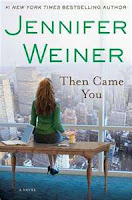So far, I've given my thoughts on a novel, two showbiz memoirs, a mystery, a history, and a YA series. I want to keep mixing it up, so tonight I'm going to write about women's fiction, specifically the latest novel by Jennifer Weiner called Then Came You.
Before I begin on the novel, though, I want to make it clear that I can't stand the term "chick lit." The name is too fluffy, too silly, and most of all too derogatory to apply to a category of fiction as diverse and meaningful as women's fiction. What is women's fiction, anyway? To me, it's simply a collection of novels that focus on women's issues and relationships, generally written by and for women. I think that "chick lit" is something invented by the same guy who coined the phrase "chick flick," meaning something he would not be comfortable reading or viewing for fear of being spotted by another man. Which is something I hope will change in the future, but that's another opinion for another blog.
Then Came You is a multiple perspective novel, written from the points of view of Jules, a Princeton senior who is both incredibly beautiful and strapped for cash; Annie, a wife and mother of two who is struggling to find both her identity and the means to finish her dream home; India, the stereotypical "younger woman" to her rich husband, whose true past is a mystery; and Bettina, India's very reluctant stepdaughter, straight-laced, distrustful and protective of her father. The four women's stories are tied together by a life, the life of a baby that becomes both wanted and loved by all four. India is the woman desperate for a child, whose IVF efforts have failed; Jules, due to her intelligence and beauty, is the quintessential egg donor; Annie is the surrogate who welcomes the change to her body and her life; and Bettina, through a twist of fate, steps into a role in the baby's life far beyond that of half-sister.
Multiple perspective novels, when written well, are always among my favorites. Jodi Picoult uses this technique so well, and now I'm going to add Jennifer Weiner to the list. (Incidentally, the novel I am writing is in multiple perspectives, so these women are my current idols.) The voices of all four women are distinct, and their motivations are clear. Generally when a novel switches points of view, I'm disappointed and excited in turns to see the different characters' names at the top of each chapter, depending on how much I like their voices. But in this book, I enjoyed them all, despite their wide variety. I liked Bettina's anger, Jules's confusion, India's intrigue, and Annie's warmth. Jennifer Weiner also handles her plot very well, saving some big surprises for the end, and playing out each woman's story both to serve the character's personal desires as well as the group dynamic at the end.
I have to say I wasn't a big fan of Jennifer Weiner's earlier work, even some of the books she got initial recognition for, like In Her Shoes (which did make a great movie). But I liked last year's Best Friends Forever, and she won me over with Then Came You. I might even be willing to go back and revisit some of her previous books. Maybe I was wrong, or maybe reading it with fresh eyes will make the difference. Whether I like the older books or not, I'll be adding Jennifer Weiner's next novel to my women's fiction (NOT CHICK LIT!) reading list.

No comments:
Post a Comment